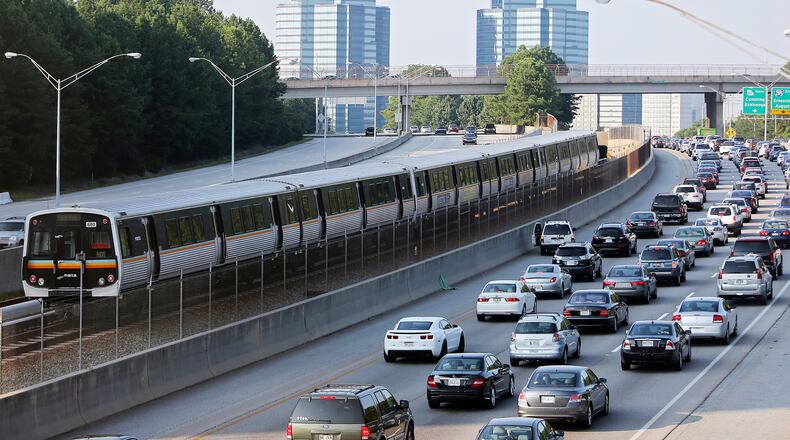Georgia officials Tuesday announced a major down payment on a transit expansion along Ga. 400 in north Fulton County.
The state will spend $100 million over the next several years to build four new interchanges for commuter buses along a 16-mile stretch of the busy highway between I-285 and McFarland Parkway in Alpharetta.
Many of the details – including where the interchanges will be built – remain to be worked out. But the announcement is the latest evidence that transit – long an afterthought on Georgia’s list of transportation priorities – now has solid backing among the state’s political leaders.
“This is a huge step, and it shows the sea change in attitudes by the Republican Party,” said Sandy Springs Mayor Rusty Paul, a former chair of the Georgia GOP. “It shows that we can change, we can be flexible, and move forward with reality.”
This spring lawmakers approved Gov. Nathan Deal's request for $100 million in bonds for transit construction. On Tuesday Deal and other officials announced that money will go to land-acquisition and construction of four transit interchanges along one a stretch of highway that carries some 230,000 vehicles a day.
The interchanges are needed to provide bus rapid transit service along Ga. 400 - service envisioned in a transit expansion plan approved by Fulton County officials earlier this year.
Supporters liken bus rapid transit to passenger rail on tires – customers board at stations, and the vehicles make limited stops to speed commuters to their destination.
The Ga. 400 buses would operate in new toll lanes the state plans to build along the highway, and the new interchanges would connect buses to transit stations and park-and-ride lots.
Federal officials recently announced they would provide $184 million for the $1.8 billion toll-lane project. And MARTA has said it will pay to operate the bus rapid transit line out of its existing budget.
The total cost of the new bus rapid transit line has not been determined. But Georgia Department of Transportation Commissioner Russell McMurry said the state’s $100 million is a substantial down payment on the construction cost.
It’s the first time the state, Fulton County and MARTA have directly partnered on a mass transit system, Deal said.
“We are introducing collaborative solutions for both transportation and transit, which is exactly what the ATL and Georgia’s commitment to improving mobility are all about,” he said.
GDOT will begin acquiring land for the interchanges and transit stations next year, and could begin selecting a contractor in mid-2020.
For the project to move forward, Fulton County voters would have to agree to raise sales taxes to help pay for construction of transit stations and other facilities. Local officials said the state and federal investments will give voters another incentive to support the county’s plans to use rapid buses to combat traffic congestion.
“It’s a quality of life issue,” County Commissioner Liz Hausmann said. “The house is on fire. We’ve got to put it out.”
Momentum for transit expansion has been gaining ground across metro Atlanta since voters rejected a $7.2 billion regional road and transit construction package in 2012.
Clayton County voters got things started in 2014, agreeing to join MARTA. Two years later, Atlanta voters approved a $2.5 billion MARTA expansion package.
Gwinnett and Fulton counties also are preparing for transit expansion votes, and DeKalb and Cobb counties may not be far behind.
This spring the General Assembly approved legislation allowing 13 metro Atlanta governments to raise sales taxes for transit construction, with voter approval.
Only a few years ago, political support for transit was scarce in metro Atlanta’s Republican-dominated suburbs. But the region’s awful traffic congestion has softened opposition. And major corporate relocations along MARTA lines have convinced many officials that transit is now an economic development imperative.
Georgia ranks 27th among the states in transit funding – spending about $14.5 million annually. But this is the second time in recent years the state has offered a big infusion of one-time cash for transit.
In 2015, lawmakers approved $75 million in one-time grants for transit projects. That money helped pay for 11 projects ranging from an upgrade to Gwinnett County’s Sugarloaf Mills park-and-ride lot to a new audio-visual information system for MARTA rail stations.
At Tuesday’s press conference, Republican House Speaker David Ralston and Lt. Gov. Casey Cagle – a Republican candidate for governor – signaled this year’s $100 million transit investment may not be the state’s last.
A state House of Representatives commission is studying transit issues in rural Georgia this year, and Ralston said money for rural transit agencies may follow.
Keep Reading
The Latest
Featured






